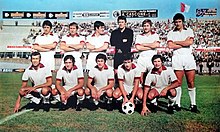Paolo Pulici
|
Torino in 1976 | |||
| Personal information | |||
|---|---|---|---|
| Full name | Paolino Pulici | ||
| Date of birth | 27 April 1950 | ||
| Place of birth | Roncello, Italy | ||
| Height | 1.77 m (5 ft 10 in) | ||
| Position(s) |
Striker | ||
| Team information | |||
Current team | Tritium (youth) | ||
| Youth career | |||
| 19??–1967 |
Legnano | ||
| 1967–1968 |
Torino | ||
| Senior career* | |||
| Years | Team | Apps | (Gls) |
| 1966–1967 |
Legnano | 1 | (0) |
| 1967–1982 |
Torino | 335 | (134) |
| 1982–1983 | Udinese | 26 | (5) |
| 1983–1985 |
Fiorentina | 40 | (3) |
| Total | 412 | (142) | |
| International career | |||
| 1969–1972 | Italy U21 | 9 | (5) |
| 1973–1978 | Italy | 19 | (5) |
| Managerial career | |||
| 1986–1989 | Piacenza (Assistant) | ||
| 1990– | Tritium (Youth) | ||
| *Club domestic league appearances and goals | |||
Paolo Pulici (Italian pronunciation:
He had several nicknames: amongst the most famous were Pupi and the one created for him by the journalist Gianni Brera, Puliciclone (a pun on his family name, Pulici, and Ciclone, Italian for "cyclone").[2] Plus, he shared with his teammate Francesco Graziani the collective nickname I gemelli del gol (Italian for "The Twins of Goal"). At international level, he represented Italy at two FIFA World Cups, first in 1974, and subsequently in 1978, where he helped the team to a fourth-place finish. Since 1990 he has taught the game of football at Sportiva Tritium 1908 in Trezzo sull'Adda, at the football school that bears his name.[1]
In 2014, he was inducted into the Torino FC Hall of Fame; he was the first player to ever be elected and was included in the "Forwards" category.[3]
Club career

Pulici was born on 27 April 1950 in Roncello, small town at the time in the Province of Milan (now Province of Monza). Initially courted by
In 1972 the coach
He played with Torino for 14 seasons, disputed 437 official games and scored 172 goals between league and cup competitions. In addition to the Scudetto won in 1975–76, he finished 2nd place in the league in 1976–77 and won a Coppa Italia trophy in 1971.
In subsequent years his number of goals diminished, with a minimum of three goals in the
International career

Pulici made his full international debut on 30 March 1973, in a 5–0 win over Luxembourg in a World Cup qualifier in Genoa. His first goals were a brace on 30 December 1975 in a 3–2 friendly win over Greece in Florence, his seventh cap. He then scored in his subsequent two matches, against Portugal and the United States.[11]
In total, he played 19 matches and scored 5 goals for the
Managerial career
After retiring, he joined the technical staff of
Style of play
A prolific, tenacious, and opportunistic right-footed forward, Pulici was also adept at using his left foot.[7] A fast, dynamic, and physically strong player,[5] he was particularly gifted in the air and was known for his ability to score acrobatic goals; he was also an accomplished penalty kick taker.[5][15]
Honours
Torino[15]
- Serie A: 1975–76
- Coppa Italia: 1970–71
Individual
- Capocannoniere: 1972–73 (17 goals), 1974–75 (18 goals), 1975–76 (21 goals)[16]
- Torino FC Hall of Fame: 2014[3]
References
- ^ a b "Paolino Pulici" (in Italian). Storie di Calcio. 7 January 2016. Retrieved 23 March 2016.
- ^ a b "Ve lo ricordate Paolino Pulici? Ecco come vive". corrieredellosport.it (in Italian). Il Corriere dello Sport. 2009. Archived from the original on 17 October 2012. Retrieved 23 April 2014.
- ^ a b "Nasce la Hall of Fame del Toro: il 3 dicembre la cerimonia per i primi 5 granata indimenticabili" (in Italian). Il Quotidiano Piemontese. 20 November 2014. Retrieved 23 March 2016.
- ^ a b c "PULICI – GRAZIANI : IN DUE PER UN GRANDE TORINO". Gol Calcio. Archived from the original on 12 August 2011. Retrieved 21 March 2014.
- ^ a b c d Bacci, G. ECO Sport (ed.). Il calcio dietro le quinte. pp. 65–66.
- ^ a b "Italy Top Scorers". RSSSF.
- ^ a b "ALL TOGHETER NOW". golcalcio.it (in Italian). Archived from the original on 20 January 2009. Retrieved 23 April 2014.
- ^ "Toro, Agroppi: "Vi racconto Gigi Meroni, il nostro George Best"" (in Italian). Toro News. 12 October 2017. Retrieved 20 January 2020.
- ^ "Pulici e Graziani, i gemelli nostalgia". corriere.it (in Italian). Il Corriere della Sera. 16 May 2001. p. 47. Retrieved 23 April 2014.
- ^ "Novellino all'Ascoli, Maldera alla Roma?" (in Italian). La Stampa. 1982. p. 17.
- ^ a b "Paolo Pulici". EU-Football.info.
- ^ List of Italy appearances RSSSF
- ^ P.Gentilotti; M.Molinaroli (December 1991). Lo sai che i papaveri...1919–1991: il Piacenza Calcio tra cronaca e storia (in Italian). p. 182.
- ^ "Rosa Piacenza Calcio 1988/89". storiapiacenza1919.it. Retrieved 23 April 2014.
- ^ a b Gigi Garanzini. "PULICI, Paolo" (in Italian). Treccani: Enciclopedia dello Sport (2002). Retrieved 11 February 2016.
- ^ Roberto Di Maggio; Igor Kramarsic; Alberto Novello (11 June 2015). "Italy - Serie A Top Scorers". RSSSF. Retrieved 2 December 2015.
